FAITH + IDEAS =: last updated 11/23/2011
November 15, 2011 Volume 4 Issue 14
. . . an e-conversation with the faculty of Gordon College . . .
By Mark Sargent
In October of 1620, soon after the Pilgrims shoved off from England, an Atlantic tempest nearly capsized the Mayflower, causing the main joist to buckle. The passengers jerry-rigged the ship, according to Governor Bradford, by hoisting the cracked beam with a “great iron screw.” Now most religious refugees don’t pack spare screws for sea: more than one historian proposes that the Pilgrims’ make-shift jack was part of a printing press slyly carted aboard. If so, their desire to publish saved their lives.
These days next to no one reads the books that the Pilgrims published in a back street—next to “Stink Alley”—during their exile in Holland. Perth Assembly, with its barbed Calvinism, kept an irate King James awake at night, but it would cure most insomniacs today. The one Pilgrim book that still commands wide attention is William Bradford’s handwritten memoir, left with his family, never intended for press. Each Thanksgiving I reread selected passages, with their biblical cadences, plaintive tone, and persistent gratitude. Late in life, the governor even filled spare pages with his Hebrew exercises, as he longed to learn the “Oracles of God” in their “ancient language.”
There is virtually no Hebrew in the graffiti on the security wall that divides modern Bethlehem, on the West Bank, from Jerusalem. Most residents in Christ’s birthplace are Palestinian, most signs in Arabic. But the multi-hued protests coating the wall rely on English, a plea to Western pilgrims and tourists filing through David’s city.
A few weeks ago I went to Jerusalem and the West Bank to review the Middle East Studies Program of the Council for Christian Colleges and Universities, which had relocated from Cairo after last January’s revolution. One Egyptian scholar I met in Jerusalem spoke apprehensively of the “Arab Spring” that had toppled President Mubarak but left his nation under military rule. Euphoria over the president’s resignation was tempered by anxiety over new sectarian violence and recriminations. In October, despite the work of peace-minded Muslims, extremists in the Egyptian security forces stormed a peaceful Coptic Christian demonstration, slaying more than two-dozen.
Thanksgiving always prompts tributes to human freedom. That 1620 voyage of the Mayflower, a veteran of wine and lumber trades, has long been an American metaphor for the liberties of faith and speech. Few recent global events testify to the power of free expression more than the days when social media filled the squares of Cairo with protesters. Yet, as I was told, Egyptian and Western scholars had long been warning about chaos after Mubarak’s death, and the rapid overthrow of his rule brought those risks sooner rather than later. Social media can help topple the head of state but they still remain uneven tools of statecraft.
On our final morning in Jerusalem we rode to the Arab hotel built over Jewish graves on the Mount of Olives, walked downhill to Gethsemane, and then wound our way to the excavations of the biblical city just outside the great stone walls. An Arab taxi driver, with a graduate degree, took us back to our lodgings near Bethlehem. Not long after my return home, my wife Arlyne and I went to Plymouth, a prelude as it were for Thanksgiving. On that Thursday I will return as usual to the pages of Bradford’s memoir, even as I will now reread a few psalms of thanksgiving and ascent that the Hebrews sang on that Jerusalem slope.
At first glance, the Jerusalem of the Pilgrims’ imagination—a symbol of spiritual loss and recovery—seems a far cry from the divided Jerusalem of our time. But Bradford’s struggle to balance freedom and responsibility during an age of rapid global change is not without contemporary echoes. A youthful separatist who feared the stranglehold of the English government on his faith, Bradford would eventually face the challenge of guiding a new community on contested land, with its own forms of violence and dissent, and adapting to a transatlantic economy full of multi-lingual trade, racial distrust, and sectarian friction.
With recent trips to Jerusalem and Plymouth in mind, I also enter this Thanksgiving—my last at Gordon—reflecting on the vicissitudes of our mission here, not far from the Mayflower’s landfall. Like the governor, we ponder how the wisdom of the “ancient language” resonates in the corridors of modern conflict. We value the dissenting press, even as we strive to preserve our central beams of creed and civility. We respect the Pilgrims’ confessional spirit and historical sense, even as we must navigate the new democracy of cyberspace. We want our voyages to bring us to safety, but not aloof from currents of injustice. Trying to forge a curriculum and ethos to balance all that has been a privilege, and always leaves one with a lingering ache for the work still undone.
I felt both ache and hope while walking with students through Jaffa Gate, hearing of their work with families of Jewish victims and with Palestinian school children in East Jerusalem. The sun-starched cityscapes seemed a long way from New England, especially with the reports of snow descending on fall colors. As we strode near Bethlehem’s graffiti-filled partition, we saw the painted faces of poor Arab youth as well as a photo of that October snowfall—on a student’s iPhone, sent from the Northeast, and posted on a Facebook wall.
Mark Sargent began writing his annual Thanksgiving column for Faith + Ideas= in 2008. Since 1996, he has been the provost at Gordon College in Wenham, MA, and will assume the provost's position at Westmont College in California this coming spring. He and his wife live in Hamilton, MA.
